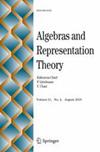关于有限群法典的说明
IF 0.6
4区 数学
Q3 MATHEMATICS
引用次数: 0
摘要
让 \(\chi \) 是一个群 G 的不可还原字符,并且 \(S_c(G)=sum _{\chi \in \textrm{Irr}(G)}\textrm{cod}(\chi )\) 是 G 的不可还原字符的编码度之和。我们的目的是用\(\textrm{fcod} (G).\) 来探索有限群的结构。另一方面,我们确定了不可解群的\(S_c(G)\)下界,并证明了如果 G 是不可解的,那么当且仅当\(G\cong A_5.\) 时,\(S_c(G)\geqslant S_c(A_5)=68,\) 是相等的 此外,我们还证明了存在一个可解群,使得它具有\(A_5.\)的codegree sum。本文章由计算机程序翻译,如有差异,请以英文原文为准。
A Note on the Codegree of Finite Groups
Let \(\chi \) be an irreducible character of a group G, and \(S_c(G)=\sum _{\chi \in \textrm{Irr}(G)}\textrm{cod}(\chi )\) be the sum of the codegrees of the irreducible characters of G. Write \(\textrm{fcod} (G)=\frac{S_c(G)}{|G|}.\) We aim to explore the structure of finite groups in terms of \(\textrm{fcod} (G).\) On the other hand, we determine the lower bound of \(S_c(G)\) for nonsolvable groups and prove that if G is nonsolvable, then \(S_c(G)\geqslant S_c(A_5)=68,\) with equality if and only if \(G\cong A_5.\) Additionally, we show that there is a solvable group so that it has the codegree sum as \(A_5.\)
求助全文
通过发布文献求助,成功后即可免费获取论文全文。
去求助
来源期刊
CiteScore
1.30
自引率
0.00%
发文量
61
审稿时长
6-12 weeks
期刊介绍:
Algebras and Representation Theory features carefully refereed papers relating, in its broadest sense, to the structure and representation theory of algebras, including Lie algebras and superalgebras, rings of differential operators, group rings and algebras, C*-algebras and Hopf algebras, with particular emphasis on quantum groups.
The journal contains high level, significant and original research papers, as well as expository survey papers written by specialists who present the state-of-the-art of well-defined subjects or subdomains. Occasionally, special issues on specific subjects are published as well, the latter allowing specialists and non-specialists to quickly get acquainted with new developments and topics within the field of rings, algebras and their applications.

 求助内容:
求助内容: 应助结果提醒方式:
应助结果提醒方式:


